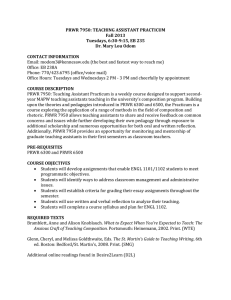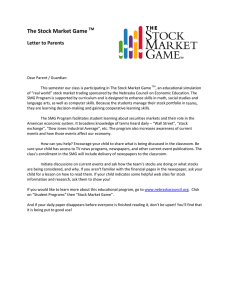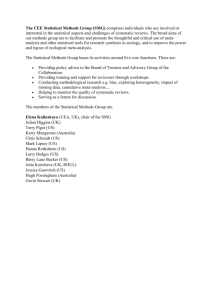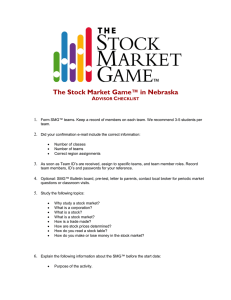PRWR 7800: TEACHING ASSISTANT PRACTICUM Fall 2014 Tuesdays, 6:30-9:15, EB 235
advertisement
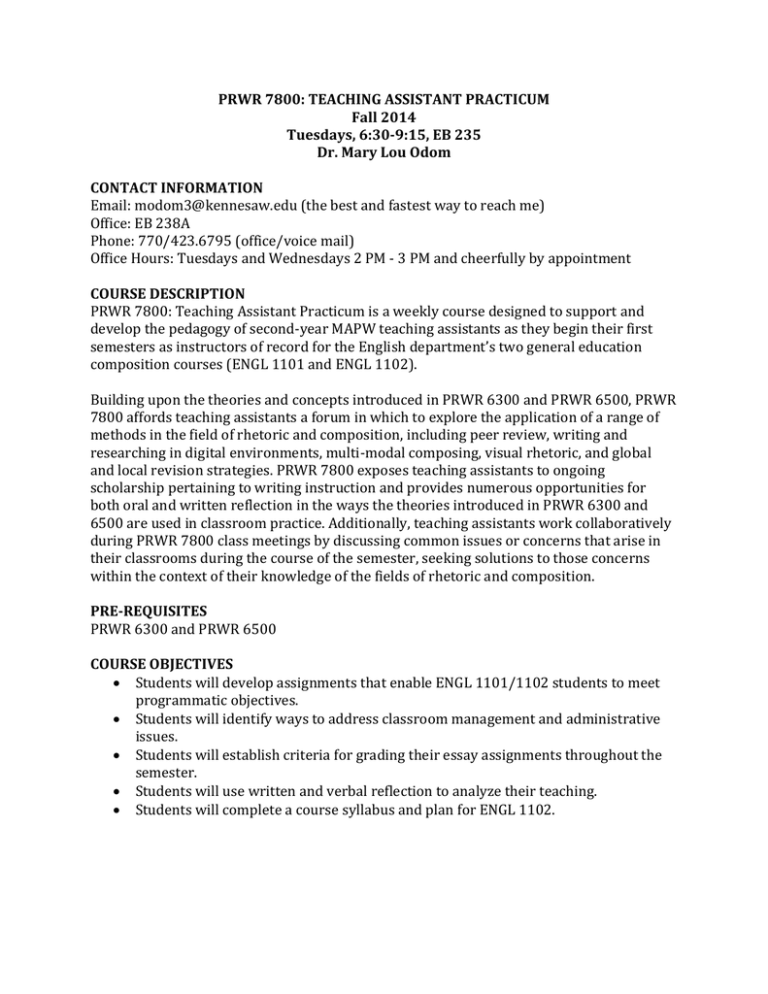
PRWR 7800: TEACHING ASSISTANT PRACTICUM Fall 2014 Tuesdays, 6:30-9:15, EB 235 Dr. Mary Lou Odom CONTACT INFORMATION Email: modom3@kennesaw.edu (the best and fastest way to reach me) Office: EB 238A Phone: 770/423.6795 (office/voice mail) Office Hours: Tuesdays and Wednesdays 2 PM - 3 PM and cheerfully by appointment COURSE DESCRIPTION PRWR 7800: Teaching Assistant Practicum is a weekly course designed to support and develop the pedagogy of second-year MAPW teaching assistants as they begin their first semesters as instructors of record for the English department’s two general education composition courses (ENGL 1101 and ENGL 1102). Building upon the theories and concepts introduced in PRWR 6300 and PRWR 6500, PRWR 7800 affords teaching assistants a forum in which to explore the application of a range of methods in the field of rhetoric and composition, including peer review, writing and researching in digital environments, multi-modal composing, visual rhetoric, and global and local revision strategies. PRWR 7800 exposes teaching assistants to ongoing scholarship pertaining to writing instruction and provides numerous opportunities for both oral and written reflection in the ways the theories introduced in PRWR 6300 and 6500 are used in classroom practice. Additionally, teaching assistants work collaboratively during PRWR 7800 class meetings by discussing common issues or concerns that arise in their classrooms during the course of the semester, seeking solutions to those concerns within the context of their knowledge of the fields of rhetoric and composition. PRE-REQUISITES PRWR 6300 and PRWR 6500 COURSE OBJECTIVES Students will develop assignments that enable ENGL 1101/1102 students to meet programmatic objectives. Students will identify ways to address classroom management and administrative issues. Students will establish criteria for grading their essay assignments throughout the semester. Students will use written and verbal reflection to analyze their teaching. Students will complete a course syllabus and plan for ENGL 1102. REQUIRED TEXTS Bramblett, Anne and Alison Knoblauch. What to Expect When You’re Expected to Teach: The Anxious Craft of Teaching Composition. Portsmouth: Heinemann, 2002. Print. (WTE) Glenn, Cheryl, and Melissa A. Goldthwaite, Eds. The St. Martin's Guide to Teaching Writing, 7th ed. Boston: Bedford/St. Martin's, 2014. Print. (SMG) Additional online readings found in Desire2Learn (D2L) GRADING and ASSIGNMENTS Details for both the “Schedule of Assignments” (showing a daily breakdown of readings and other due dates) and all graded assignments are found in D2L. If we need to adjust this schedule, I will alert you either in class or via email (or both) and update the “Schedule of Assignments” posted in D2L; this version will always be the most current. Final Grade Breakdown Below you will find a breakdown of your final course grade. Please remember to refer to each Assignment Description in D2L for detailed information on what is expected of each component, and note that penalties may be applied to your final grade for failure to meet attendance requirements. Teaching Blog Observation English 1102 Course Design Teaching Final Reflection Evaluation Reflection 20% 10% 30% 20% 20% Grading Scale A (90-100) B (80-89) C (70-79) D (60-69) F (Below 60) Teaching Journal and Blog A key part of successful teaching is successful reflection – both individual reflection and the reflection that results from being a part of a teaching community. Your Teaching Journal will afford you the opportunity to do the former, and our more formal Teaching Blog, in which you will each share a teaching strategy, activity, or issue (and respond to each other) will be a space in which you participate in the latter. In both spaces, you will use the theories you have learned to analyze your own practice. 2 Observation Each teaching assistant responsible for an English 1101 course will be observed once during the semester. You will select the date on which you are observed. We will discuss the class period to be observed before your observation, and you will receive a letter discussing your observed course and offering feedback within two weeks of your observation. English 1102 Course Design Around mid-term, you will begin to look ahead and plan for spring semester, in which you will teach English 1102. You will submit a plan for your syllabus and assignments to me, and I will provide feedback. Final Teaching Reflection As your first semester in the classroom draws to a close, you will submit a brief reflection on what you have learned about yourself as a teacher and the practice of teaching. Evaluation Reflection Another key part of the reflection process is to think critically about student evaluations. After you receive these evaluations, you will write a brief reflection on how you will consider them in your future teaching. Expectations Practicum expectations are higher than those for other graduate courses in part because you are also the instructor of record for two courses. Your performance in and commitment to this class are indicative of your overall success in fulfilling your TA obligations. I expect all reading and writing you do to reflect your best, graduate-level effort. That means work that demonstrates above-average critical thinking and is free of error, participation that is engaged and consistent, and attentiveness to all course obligations that is beyond reproach. Late Work I do not generally accept late work of any kind. Should extraordinary personal circumstances arise, you should contact me as soon as possible (preferably well before the due date), and we will discuss your particular situation and any grade penalty that will be assessed. PARTICIPATION Participation means fulfilling all online obligations as well as coming to class having done all assigned reading and written work for that day. I take this very seriously: Attentiveness and engagement are important parts of graduate education. The degree to which you actively participate in our Practicum will determine what you get out of it. 3 ATTENDANCE Attendance is mandatory for all classes. The work we do in our weekly meetings cannot be “made up” simply by getting notes or doing the reading on your own. Missing class more than once lowers your final grade by one full letter. A fourth absence (the equivalent of missing almost one third of our class meetings), means you automatically fail the course. Excessive and/or habitual lateness also results in accumulated absences. Please inform me as soon as possible should special circumstances arise, and alert me in advance if you know you will be absent. In the event of an absence, you must contact a class member for information on what was covered in class; due dates and deadlines will still apply. KSU DIVERSITY STATEMENT The KSU population reflects differing backgrounds and experiences including but not limited to age, disability, ethnicity, family structure, gender, geographic region, language, race, religion, sexual orientation, and socioeconomic status. It is our goal to foster a community in which every human being is treated with dignity, respect, and justice. The KSU academic experience will provide the opportunity to gain knowledge and experiences necessary to thrive in a diverse, global environment. KSU ACADEMIC INTEGRITY STATEMENT Every KSU student is responsible for upholding the provisions of the Student Code of Conduct, as published in the Undergraduate and Graduate Catalogs. Section II of the Student Code of Conduct addresses the University’s policy on academic honesty, including provisions regarding plagiarism and cheating, unauthorized access to University materials, misrepresentation/ falsification of University records or academic work, malicious removal, retention, or destruction of library materials, malicious/ intentional misuse of computer facilities and/or services, and misuse of student identification cards. Incidents of alleged academic misconduct will be handled through the established procedures of the University Judiciary Program, which includes either an “informal” resolution by a faculty member, resulting in a grade adjustment, or a formal hearing procedure, which may subject a student to the Code of Conduct’s minimum one semester suspension requirement. In this course, a variety of actions can constitute plagiarism. Cutting and pasting a paragraph or even a sentence (without quotes and documentation) from a website are obvious examples. But including ideas or facts from a text, website, or from another person into your work without indicating your source is also plagiarism. I take any violation of academic honesty and integrity very seriously and will assess grade penalties and pursue disciplinary action accordingly. KSU DISABILITY STATEMENT If you have a specific physical, psychiatric, or learning disability that requires accommodations, please let me know early in the semester so that your learning needs may be appropriately met. You will need to provide documentation of your disability to the disAbled Student Support Services office, located in the Student Center, Room 267, and 4 obtain a list of approved accommodations. DSSS helps students with disabilities participate in and benefit from programs, courses, and activities on the KSU campus. DSSS can be reached at 770-423-6443; their website is http://www.kennesaw.edu/stu_dev/dsss/dsss.html. 5 PROFESSIONAL WRITING 7800: TEACHING ASSISTANT PRACTICUM SCHEDULE OF ASSIGNMENTS FALL 2012 The St. Martin's Guide to Teaching Writing (SMG) What to Expect When You’re Expected to Teach (WTE) Online readings can be found in D2L. August 21 Course Overview and Need-based Planning August 28 READING: “Teachable Moments” (WTE) “Breaking the Silence: A Study of Gender Specific Problems in the Writing Classroom” (online) BLOG: post introductions September 4 READING: “Teaching the Millennial Generation” (online) Observation Sign-up: Bring your planners and the syllabi/schedules for your classes September 11 READING: “Everyday Activities” (SMG Chapter 3) “Teaching Delivery” (SMG Chapter 10) BLOG: post #1 due. September 18 READING: “Minimum Requirements” (WTE) “Teaching Invention” (SMG Chapter 6) “Responding to Student Writing” (SMG) BLOG: post #2 due. September 25 READING: “A Language in Letters” (WTE) “Teaching Arrangement and Form” (SMG Chapter 7) “Why I (Used to) Hate Giving Grades” (SMG) BLOG: post #3 due. October 2 READING: “Successful Writing Assignments” (SMG Chapter 4) “Rethinking Diverstiy: Axes of Difference in the Writing Classroom” (SMG) “Meaning and Development of Academic Literacy in a Second Language” (SMG) BLOG: post #4 due. October 9 READING: “BEAM: A Rhetorical Vocabulary for Teaching Research-Based Writing” (online) ENGL 1102 Guideline, Expectations, Texts (First-Year Composition Website) Discussion of English 1102 Course Design BLOG: post #5 due. October 16 READING: “My Imagined Community” (WTE) “Teaching Style” (SMG Chapter 8) Teaching Journals collected BLOG: post #6 due. 6 October 23 “Memory as Database: Teaching Research” (SMG) Peer Review: ENGL 1102 Course Design October 30 READING: “Forty-Eight Eyeballs” (WTE) “Teaching Memory” (SMG Chapter 9) “The Complexities of Responding to Student Writing” (online) BLOG: post #7 due. November 6 READING: “Silences in Our Teaching Stories” (WTE) BLOG: post #8 due. Looking ahead to end-of-semester reflections November 13 Revisions of ENGL 1102 Syllabi, Assignment Schedule, and Major Assignments due Peer Review BLOG: Final post due. November 20 Course Design Presentations November 27 ENGL 1102 Course Design Project due Teaching Journals due – discussion of Teaching Journals and what they teach us Evaluations December 5 Reflective Essay due Evaluation Reflection due 7
